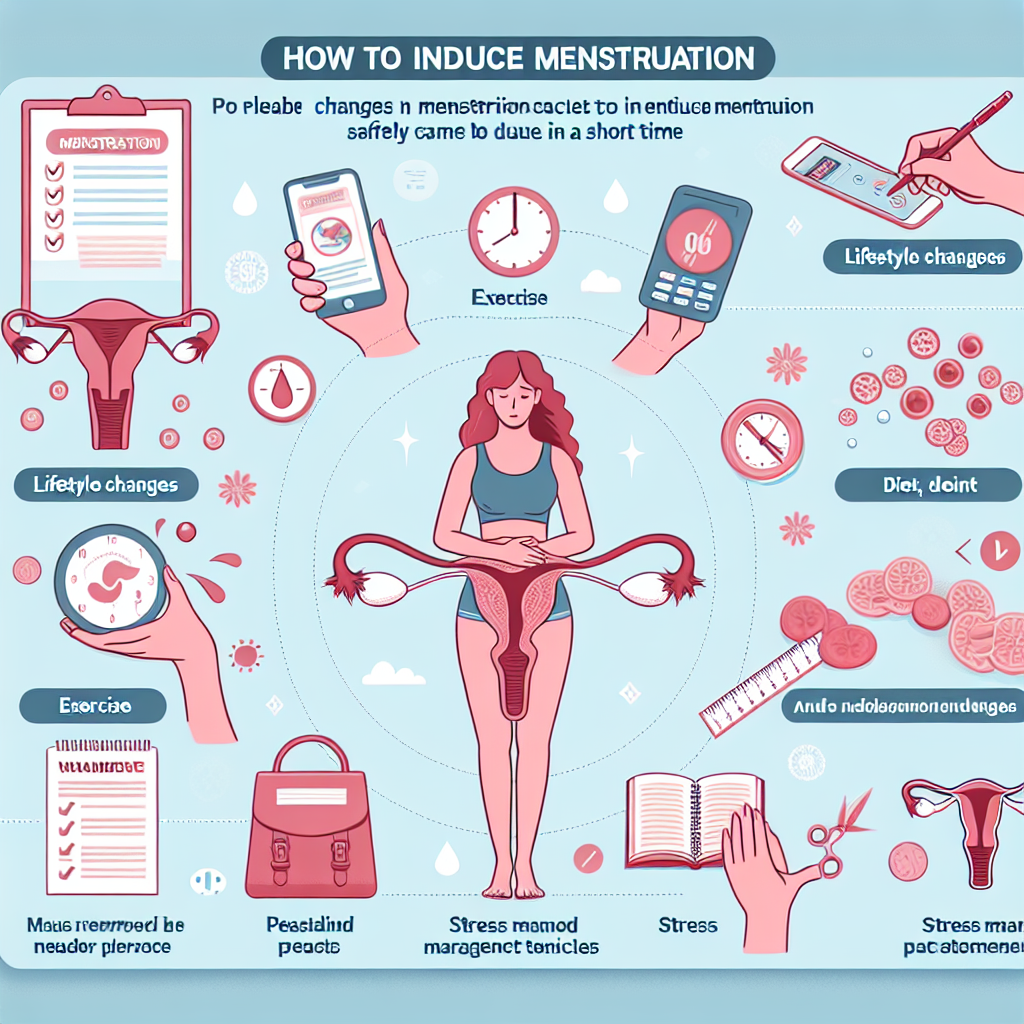-
Table of Contents
- How to Get Periods Immediately in One Hour: Debunking the Myths and Exploring the Facts
- Understanding the Menstrual Cycle
- Debunking the Myths
- 1. Consuming Certain Foods
- 2. Exercising Vigorously
- 3. Taking Certain Medications
- Exploring the Facts
- 1. Hormonal Birth Control
- 2. Progesterone Therapy
- 3. Stress Reduction
- Q&A
- 1. Can drinking hot water induce periods?
- 2. Can having sex bring on periods?
- 3. Can herbal remedies induce periods?
- 4. Can weight loss or gain affect the menstrual cycle?
- 5. Can birth control methods be used to skip periods?
- Summary
How to Get Periods Immediately in One Hour: Debunking the Myths and Exploring the Facts

Menstruation is a natural process that occurs in the female reproductive system. It is a monthly cycle that prepares the body for pregnancy. However, there may be times when you want to induce your period immediately, whether it’s for personal reasons or to alleviate discomfort. In this article, we will explore various methods that claim to bring on periods within an hour, separating fact from fiction and providing you with valuable insights.
Understanding the Menstrual Cycle
Before delving into methods to induce periods, it’s essential to understand the menstrual cycle. The menstrual cycle is typically 28 days long, although it can vary from person to person. It consists of four phases:
- Menstrual Phase: This is when bleeding occurs as the uterus sheds its lining.
- Follicular Phase: The body prepares for ovulation by developing follicles in the ovaries.
- Ovulatory Phase: The ovary releases an egg, which can be fertilized by sperm.
- Luteal Phase: If fertilization doesn’t occur, the uterus prepares for the next menstrual phase.
Now that we have a basic understanding of the menstrual cycle, let’s explore the methods that claim to induce periods within an hour.
Debunking the Myths
1. Consuming Certain Foods
There is a common belief that consuming certain foods, such as pineapple or papaya, can induce periods. However, there is no scientific evidence to support this claim. While these fruits contain enzymes that may help with digestion, they do not have the ability to trigger menstruation.
2. Exercising Vigorously
Some people believe that engaging in intense physical activity, such as running or doing high-intensity workouts, can bring on periods. While exercise has numerous health benefits, there is no scientific evidence to suggest that it can immediately induce menstruation. In fact, excessive exercise can disrupt the menstrual cycle and lead to irregular periods or even amenorrhea (absence of periods).
3. Taking Certain Medications
There are claims that certain medications, such as aspirin or birth control pills, can trigger periods. However, these claims are not supported by scientific evidence. Aspirin is a pain reliever and blood thinner, while birth control pills are designed to regulate the menstrual cycle, not induce immediate periods.
Exploring the Facts
1. Hormonal Birth Control
Hormonal birth control methods, such as combined oral contraceptives or the contraceptive patch, can be used to regulate the menstrual cycle. These methods contain synthetic hormones that mimic the natural hormones in the body, preventing ovulation and regulating the menstrual cycle. However, they cannot bring on immediate periods within an hour.
2. Progesterone Therapy
Progesterone therapy is a medical treatment that involves taking progesterone supplements to induce periods. This method is commonly used to regulate irregular periods or treat conditions such as polycystic ovary syndrome (PCOS). However, progesterone therapy requires a prescription and should be administered under the guidance of a healthcare professional.
3. Stress Reduction
Stress can have a significant impact on the menstrual cycle. High levels of stress can disrupt hormonal balance and delay periods. Therefore, reducing stress through relaxation techniques, such as meditation, yoga, or deep breathing exercises, may help regulate the menstrual cycle. However, it is important to note that the effects of stress reduction techniques may vary from person to person, and immediate results cannot be guaranteed.
Q&A
1. Can drinking hot water induce periods?
No, drinking hot water does not have the ability to induce periods. While staying hydrated is important for overall health, it does not directly affect the menstrual cycle.
2. Can having sex bring on periods?
Having sex does not directly induce periods. However, sexual activity can stimulate contractions in the uterus, which may help expel the menstrual blood more quickly. It is important to note that engaging in sexual activity should always be consensual and safe.
3. Can herbal remedies induce periods?
There are various herbal remedies that claim to induce periods, such as parsley tea or ginger. However, there is limited scientific evidence to support these claims. It is always advisable to consult with a healthcare professional before trying any herbal remedies.
4. Can weight loss or gain affect the menstrual cycle?
Significant weight loss or gain can disrupt the hormonal balance in the body and lead to irregular periods or even amenorrhea. Maintaining a healthy weight through balanced nutrition and regular exercise is important for overall menstrual health.
5. Can birth control methods be used to skip periods?
Yes, certain hormonal birth control methods, such as extended-cycle pills or the contraceptive implant, can be used to skip periods. These methods allow individuals to have fewer periods throughout the year by manipulating the hormone levels in the body. However, it is important to consult with a healthcare professional before considering this option.
Summary
While there are numerous claims and myths surrounding methods to induce periods immediately within an hour, it is important to separate fact from fiction. Consuming certain foods, exercising vigorously, or taking specific medications cannot bring on immediate periods. Hormonal birth control and progesterone therapy can help regulate the menstrual cycle, but they do not provide immediate results. Stress reduction techniques may have an impact on the menstrual cycle, but individual results may vary. It is always advisable to consult with a healthcare professional for personalized advice and guidance regarding menstrual health.
Remember, menstruation is a natural process, and the menstrual cycle can vary from person to person. Understanding your body and maintaining overall health through balanced nutrition, regular exercise, and stress management are key factors in promoting a healthy menstrual cycle.











